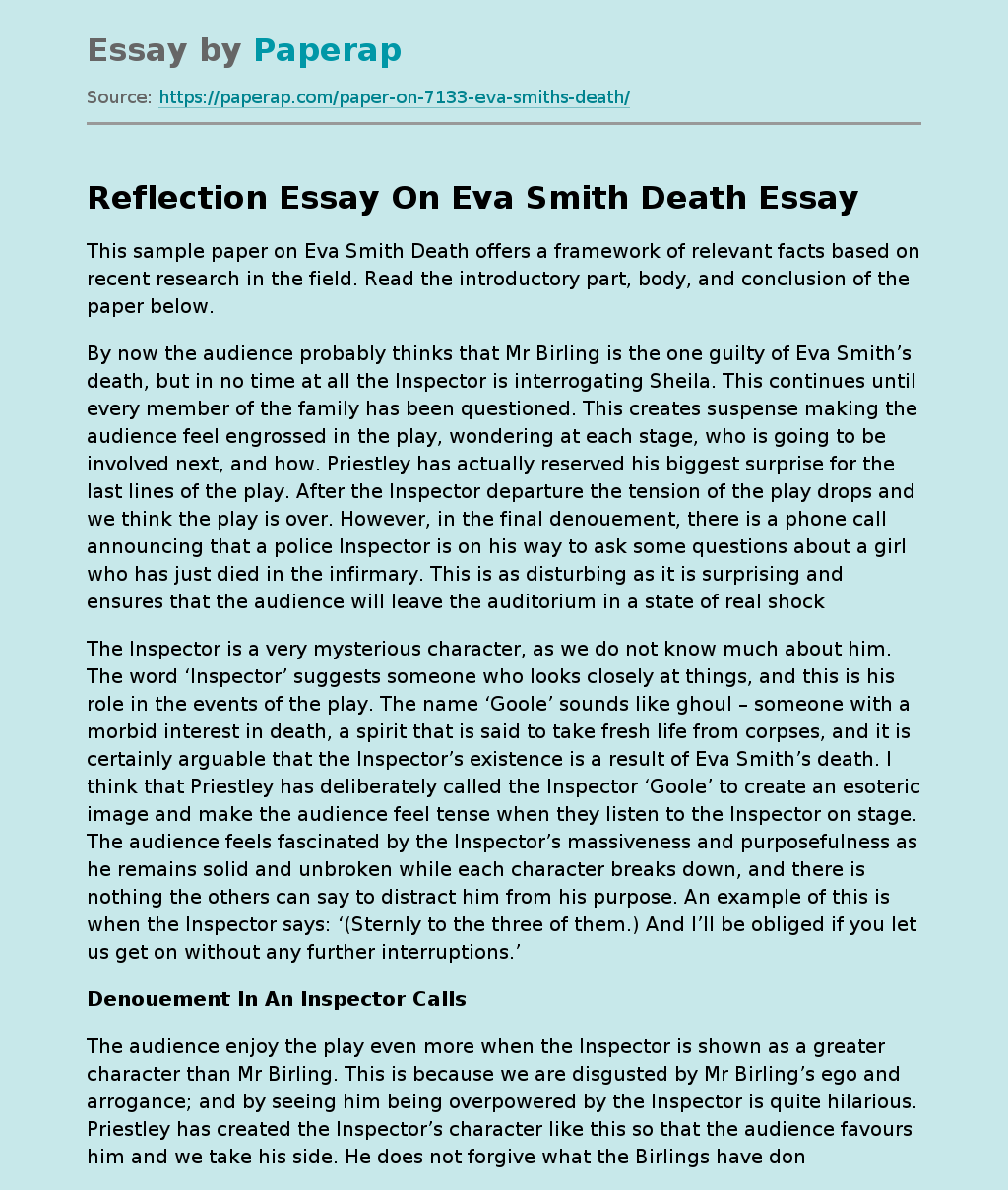Denouement "In An Inspector Calls" by John Boynton Priestley
The audience enjoy the play even more when the Inspector is shown as a greater character than Mr Birling. This is because we are disgusted by Mr Birling’s ego and arrogance; and by seeing him being overpowered by the Inspector is quite hilarious. Priestley has created the Inspector’s character like this so that the audience favours him and we take his side. He does not forgive what the Birlings have done, but when they freely admit their faults he allows them to see that they can find forgiveness through future good behaviour.
His approach has been perhaps too abrasive, and he is clearly someone for whom social conventions count for nothing when weighed against the desire for truth and justice. Priestley has written a typical play that has a villain and a hero. Most of the audience would definitely like the hero, in this case the Inspector, whereas they would be against the villains, the members of the Birling family.
The play is set in Edwardian times where society was strictly divided into social classes and over two-thirds of the nation’s wealth was in the hands of less than one percent of the population. Below the very rich were the middle classes. For example the doctors and merchants, shop workers and clerks. After this came the craftsmen and skilled workers. At the very bottom of the social ladder was the largest class of all – the ordinary workers and the poor, many of whom lived below the poverty level.
The men of industry treated the workers very badly and they were paid a pittance. This caused workers to become better organised and strikes were becoming more frequent as they demanded better conditions and higher pay. Priestley was writing the play for a middle class audience and was trying to speak up for the working class by showing how the Birlings and Gerald Croft were all involved in making a young working class girl’s life a misery.
Priestley wants to show us that we have a responsibility to others to act fairly and without prejudice and that we do not live in isolation. He shows that our actions affect others when the Inspector says: “…millions of Eva Smiths and John Smiths still left with us, with their lives, their hopes and fears, their suffering and chance of happiness, all intertwined with our lives and what we think and say and do.”
We have to confront our mistakes and learn from them. Through the Inspector acting as our conscience we are made aware that there are those in higher positions in society who have power yet abuse it. They take advantage of those weaker than themselves. Eva Smith was a working class girl trying to make a living. Through those in power she was used terribly, then when she was no longer of any use she was got rid of. JB Priestley wanted to show that this would continue to happen if society does not learn from these mistakes made. The audience feels sympathy towards Eva Smith and is curious to see if the Birlings have learnt from their mistake.
Priestley has shown us how middle class people act in society and the way in which they regard lower citizens. He hopes we will realise how the younger generations are the ones who can change the society in which we live. He shows this when Mr and Mrs Birling learn nothing from their mistakes whereas Eric and Sheila do. The Inspector brings the play to a close, summarising Priestley’s message when he says ‘We don’t live alone. We are members of one body. We are responsible for each other’ exactly the opposite to what we are told to believe by Mr Birling, that everybody should look after themselves.
Priestley conveys his message well, showing us how the situation can be changed and who to depend on to change it. I think the success and popularity of ‘An Inspector Calls’ accounted for by the fact that it is very entertaining as there is a mixture of suspense and mystery but is also a play that conveys a moral message. This makes the play appeal to a widest possible audience especially the middlebrow.
Denouement "In An Inspector Calls" by John Boynton Priestley. (2019, Dec 06). Retrieved from https://paperap.com/paper-on-7133-eva-smiths-death/

